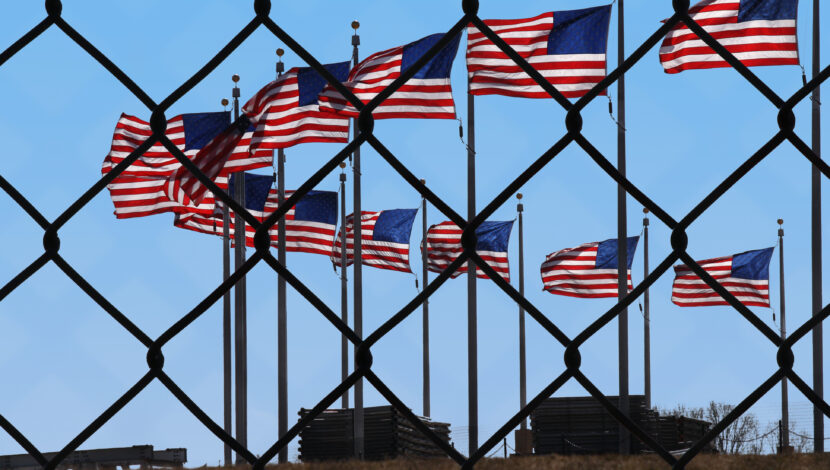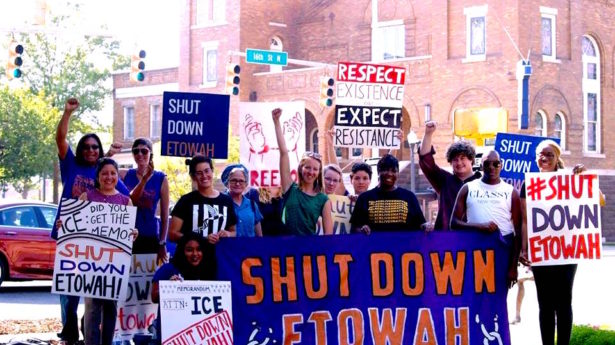The Unitarian Universalist Service Committee advances human rights through grassroots collaborations.
The Stain of Violence in Del Rio Remains

By UUSC Staff on October 6, 2022
Roughly a year ago, the public caught a searing glimpse into the racialized violence of current U.S. immigration policy, after reporters photographed Border Patrol officers on horseback grabbing, manhandling, and appearing to whip Haitian asylum-seekers encamped in Del Rio, Texas. While few will forget the images that shocked the world’s conscience that day, all too many have forgotten the cruel policy that enabled this violence, and which remains in effect today: Title 42. As we mark the completion of a full year since these ugly events, we again call on the U.S. government to end Title 42 and restore full access to asylum at the U.S. border.
Despite the passage of a year, few officers or policymakers have been meaningfully held accountable for the abuses we witnessed in September 2021. U.S. Customs and Border Protection (CBP) has published the results of its own investigation into the conduct of its officers at Del Rio, concluding that the agents did not strike anyone with their reins, though some did use “unnecessary force.” Startlingly, though, the authors of this report did not interview any of the Haitian asylum-seekers who experienced this violence. Immigrant advocates, including UUSC’s partner UndocuBlack, have also filed suit alleging the administration failed to respond to freedom of information requests about the events at Del Rio. As such, CBP’s report is self-serving and biased, and it is hard to attach much credibility to its findings.
In case there was any doubt as to the culture of anti-Black racism and xenophobia that pervades U.S. border enforcement, meanwhile, a so-called “challenge coin” appeared online this past summer endorsing and celebrating the abuse of Haitian refugees in a derisive way. The coin depicted a CBP officer manhandling a Haitian man alongside the caption “Reining it in since May 28, 1924.” CBP leadership swiftly disavowed the coin and announced an ethics investigation to determine whether any CBP personnel were involved in making or selling it. As earlier reporting indicates, however, the racist and demeaning attitudes the coin reflects appear to be widespread among rank-and-file members of the border patrol.
President Joe Biden captured the emotions of many in September 2021 when he described the images of CBP’s treatment of Haitian refugees as “horrific and horrible.” His administration vowed to investigate the conduct of the officers responsible and, “get to the bottom of what happened.” Yet we have already seen how little ultimately came of that inquiry. Plainly, the investigation has done little to correct the internal culture at CBP, hold the officers responsible, or lead to a meaningful change in policy. With more than a year now behind us, the president’s promises at the time ring hollow.
Moreover, even if the administration had conducted a diligent inquiry—including by actually speaking with the people most affected and answering legitimate information requests from our partners and other advocates—their focus on the actions of individual officers would still be somewhat of a dodge. By publicly decrying the apparent actions of specific CBP agents, the administration diverted attention from the reason U.S. officers were inflicting this violence in the first place: the administration’s own Title 42 expulsion policy. Of the 15,000 or so Haitian asylum-seekers encamped at Del Rio in 2021, to be sure, some were allowed to stay on U.S. soil and pursue their claims for protection. But thousands of others were expelled summarily, joining the more than 20,000 Haitian refugees in total whom the Biden administration has returned to danger in their home country—against their will and without a chance to access their internationally-protected asylum rights.
Title 42 has been in effect for so long now that many forget it is supposed to be the exception rather than the norm in U.S. policy. Ordinarily, all people who arrive on U.S. soil, whether or not at an official port of entry, are legally entitled to submit a claim for asylum. This is supposed to give them a chance to establish whether they face a danger of persecution in their home country and therefore should not be deported. The Trump administration, though—as part of its broader anti-immigrant agenda—sought many times to find a way around this legal requirement. And in March 2020, the COVID-19 pandemic gave them the excuse they’d been looking for. Even as Trump undermined actual public health responses to the pandemic, he disingenuously invoked it as a pretext to shut down asylum.
The Biden administration, despite promises to the contrary, kept this order in place well into their second year in office. Then, this past spring, they finally announced steps to end it. But before the policy could be unwound, right-wing state governments intervened in federal court to block the administration’s efforts. As a result, Title 42 has lingered on far past its originally-scheduled expiration date and remains in effect today.
Meanwhile the Biden administration, though still committed publicly to ending the policy, has waffled in private on their stance. Most recently, they have reportedly pressured Mexico to help expand the policy to cover additional categories of people. They also abruptly suspended humanitarian exceptions to the policy at one port of entry after Haitian asylum-seekers protested that they were being discriminated against (as they probably were, since—as human rights observers have repeatedly found—U.S. immigration policy has long treated Haitians and other Black refugees and immigrants with disproportionate hostility and brutality). As a result, thousands of Haitian asylum-seekers are still stranded in dangerous conditions in Mexico under Title 42.
The actions the public witnessed in September 2021 were abhorrent, but they also shouldn’t distract from the deeper, structural reasons why U.S. officers keep abusing and discriminating against Haitian asylum-seekers. These reasons include the entrenched culture of racialized violence in U.S. border enforcement generally—which traces all the way back to border patrol’s origins—as well as the ongoing policies that our courts and elected officials inflict that deprive Haitian refugees and others of their legal rights. For there to be meaningful change, our elected officials must go beyond bogus investigations and empty promises. They must show the commitment to fight for the rights of all asylum-seekers—without discrimination or animus—that they promised on the campaign trail to display.
Photo Credit: iStock—Brad Greeff

